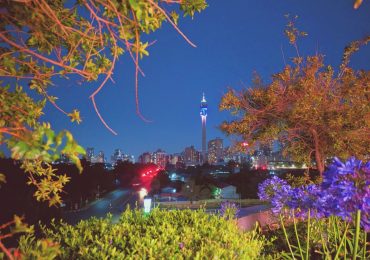Douglas Stuart has won the 2020 Booker Prize for Fiction for his novel Shuggie Bain.
Chair of judges Margaret Busby announced Stuart’s win tonight at an understated, socially distanced event at the Roundhouse in London, United Kingdom. She said the judges’ decision was unanimous and ‘took an hour to decide’.
Stuart beat American writers Diane Cook, Avni Doshi and Brandon Taylor, Zimbabwean Tsitsi Dangarembga and Ethiopian–American Maaza Mengiste to the prize. He wins £50,000 (about R1 million) in prize money, a trophy, a designer-bound edition of his book and a further £2,500 for being shortlisted.
Shuggie Bain is Stuart’s first novel. Based on his own childhood, it is a searing account of a young boy growing up in Thatcher’s Glasgow of the nineteen-eighties, with a mother who is battling addiction. Stuart dedicated the book to his own mother, who died of alcoholism when he was sixteen.
‘I’m absolutely stunned, I didn’t expect that at all,’ Stuart said. ‘I’d like to first of all just thank my mother, I think I’ve been clear that my mother is on every page of this book, and without her I wouldn’t be here and my work wouldn’t be here.’
Stuart also thanked his fellow finalists, saying ‘it’s been such a pleasure and an honour to be in your company, and I can’t wait to give you all a hug’.
‘I know I’m only the second Scottish book in fifty years,’ he continued, ‘so that means a lot for original voices or working class stories. Thank you to the people of Scotland, especially Glaswegians, whose empathy and humour and love and struggle are in every word of this book.’
He added: ‘I wanted really just to tell the story of what it was like to grow up queer in Glasgow, to grow up with a parent who you love but couldn’t save.’
Stuart is the second Scottish author to win the award after James Kelman in 1994, who won with How Late It Was, How Late, a book Stuart said ‘changed his life’ because it was the first time he saw ‘my people, my dialect, on the page’.
Stuart pointed to Kelman’s Booker-winning novel behind him on his bookshelf, calling it ‘my bible’: ‘When James won in the mid-nineties, Scottish voices were seen as really disruptive and outside of the norm. And now to see Shuggie at the centre of it, I can’t express it.
‘Young boys like me growing up in eighties Glasgow, this wasn’t ever anything I would have dreamed of.’
Featuring four writers of colour and four debut novels, this year’s shortlist was described as the most diverse and ‘freshest’ in the prize’s history. Two African writers were shortlisted for the first time in many years: Dangarembga and Mengiste, for their novels This Mournable Body and The Shadow King, respectively.
Busby said: ‘There’s been discussion in the press about how diverse a shortlist it is, in terms of class, ethnicity, gender identity. People have not held back from remarking on the make-up of the jury, and that’s as it should be.
‘There’ll be no need for comment on diversity anywhere in the literary world once it is commonplace. So note how progressive the Booker Prize is becoming.
‘It was established in 1969, the same year when the publishing company I co-founded brought out its first novel. Yet the first Black Booker judge was in 2015. Undoubtedly the Booker Prize has always championed great literature. But it was eye-opening to discover that just in the past handful of years there have been more Black judges and chairs of the jury than in the previous five decades.
‘I return often to the wisdom of Toni Morrison who in her 1992 essay ‘Black Matters’ wrote “The ability of writers to imagine what is not the self, to familiarise the strange, and mystify the familiar, is a test of their power.”
‘Discovering great literature depends on freeing imagination, being open to welcoming the new, not erecting barriers against a perceived threat from the unknown, the unfamiliar, the alien.
‘I don’t think I’m breaking the rules to say this: Please read all the books on the shortlist. Please don’t forget any of them. They will certainly remain part of my life forever.’
After the controversy last year when judges flouted the rules to choose two winners—Margaret Atwood and Bernardine Evaristo—Booker’s literary director, Gaby Wood, said that ‘guidelines’ had been added to the prize so that if the judges were split again, the majority vote would be honoured.






To which email address can I start submitting my books? since I am a book writer.